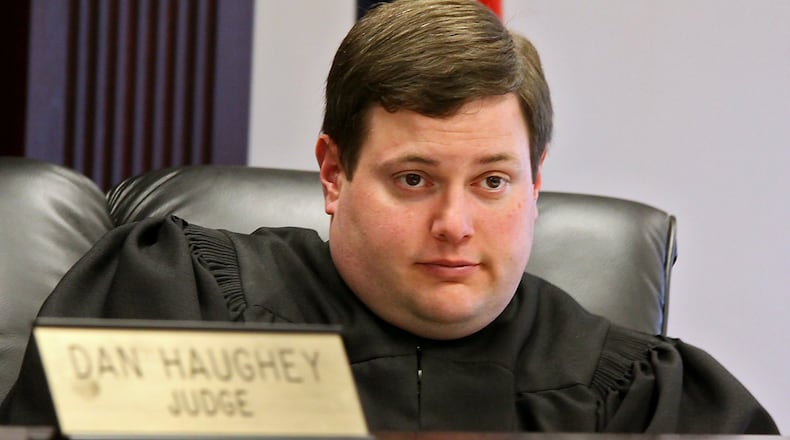“When someone struggling with a mental health or substance use disorder commits a crime, sending them to jail won’t get them the treatment they need,” DeWine said. “This funding will help specialty courts in Ohio direct those arrested for non-violent crimes toward recovery.”
The Area Courts judges told the commissioners during budget hearings this week they are starting a new drug court in January. Court Administrator Linda Lovelace told the Journal-News the court has a $50,000 federal grant and will be applying for $125,000 of the new state money.
The new drug court will be the fourth Butler County court to directly dedicate resources for cased including addiction issues.
Area III Court Judge Dan Haughey will preside over the new docket and will handle cases from all three courts. He said he will have the docket two Fridays a month and believes the docket could handle about 60 people or more. There will be a dedicated probation officer hired for the special docket.
“Typically we like to see a probation officer under normal circumstances have a caseload in the neighborhood of 150,” he said. “I would like to pare this down more than that, because this isn’t just general probation this is going to be very intensive. I want this probation officer doing home visits and following up with treatment providers.”
RELATED: 3 Butler County courts start own probation operation
The defendants on the drug docket won’t necessarily be facing drug-related charges, but could be accused of crimes caused bydrugs. The defendant will be on intensive probation and in drug treatment for at least a year possibly longer, Haughey said. If the defendants successfully complete the program their probation will be terminated.
The judge expects he will get a lot of defendants who plead guilty in Common Pleas Court to low level felonies and the charges are reduced to first-degree misdemeanors. He said there has been a legislative push to keep low-level criminals out of prisons, which is pushing the burden to the lower level courts.
“I’m seeing more and more cases in my court that are these felony fives that get reduced to misdemeanors,” he said. “Is our typical misdemeanor probation really enough to deal with these issues and the answer is no. We’ve got to have a treatment focus and the ability to have a higher degree of monitoring for these folks.”
The Butler County Common Pleas Court has had a specialty drug court docket since 2007, and that court averages about 41 defendants per month. Fairfield Municipal Court started a drug treatment docket in 2009. In the wake of the opioid epidemic that had a firm grip on Butler County, Children Services, the Juvenile Court and mental health and addiction board resurrected the family drug court that was stopped in 2012 when funds dried up.
The new funding is through the Ohio Department of Mental Health and Addiction Services, and the common pleas court already gets $100,000 from that agency, so Court Administrator Wayne Gilkison said he isn’t sure he can apply.
“We’re going to look into it, that’s something that’s on my agenda, to see if that funding would preclude us from being eligible for anything else,” Gilkison said.
MORE: New Butler County family drug court is about support, encouragement
Likewise, Juvenile Court Magistrate Pat Wilkerson, who presides over the family drug court, said she is looking into whether her current grant funding makes the court ineligible. Since the court was rebooted in 2017 she has admitted 71 parents into the program, 11 have graduated and there are currently 33 on the docket.
The municipal courts in Hamilton and Middletown don’t have specialized drug court dockets because the judges say nearly all of their cases involve drugs.
“Almost every one of our cases is drug related, so it’s like you’re in drug court all day long everyday,” Hamilton Municipal Court Judge Dan Gattermeyer said, adding they still get defendants connected to treatment with providers like Sojourner and others who are in the courtroom daily. “Most of the cases we try to connect people up with addiction services.”
Middletown Municipal Court Judge James Sherron said easily 80 percent of his cases are touched by drugs in some fashion and the shear volume precludes the intense specialized docket approach. He said the court makes treatment options available and his probation officers are top notch, which helps in getting people help.
“Our probation officers all have Master’s degrees and they each have a specialty,” Sherron said. “So they’re not your normal check in with your probation officer and you’re good to go. The probation we’re able to provide is much more in-depth, detailed and comprehensive than most other courts I’m aware of.”
Gattermeyer and Sherron said they will both explore the new funding stream.
About the Author
